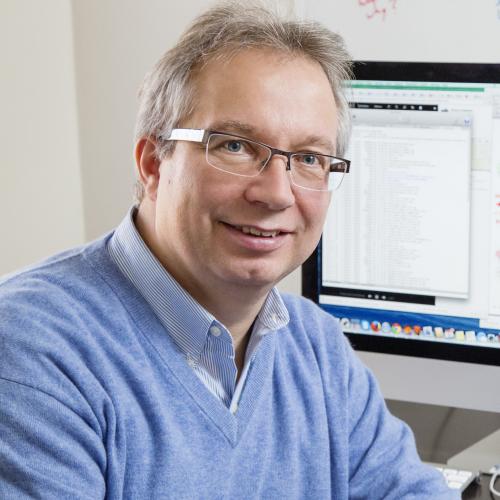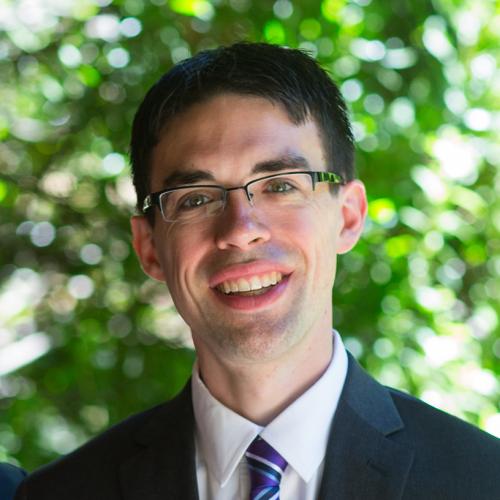

Through the Frankel Scholars internship program, students enrolled in University of Illinois Laboratory High School are able to collaborate with iSchool faculty mentors on various research projects. This year's inaugural program, managed by the National Center for Supercomputing Applications (NCSA), includes 16 students who complete internships led by an NCSA staff member or an NCSA faculty affiliate from other units on campus, including the iSchool.
The internships include research in a variety of areas, such as computational science, genetics, web development, and virtual reality. The scholars also engage in professional development activities and interact with teams of Illinois undergraduates who participate in the NCSA SPIN (Students Pushing INnovation) program.
iSchool Professor Bertram Ludäscher, NCSA faculty affiliate and director of the iSchool's Center for Informatics Research in Science and Scholarship, is mentoring Uni High students Robert Nagel, Akash Pardeshi, and Lawrence Zhao.
In Pardeshi and Zhao's joint project they study and compare the different "comprehensibility costs" of various primality proofs for natural numbers.
"Last semester, we worked on writing code to generate proofs in two forms: an 'elementary' visual proof and an 'advanced' numerical proof," Pardeshi said. "I am currently working on analyzing the costs of the proofs we developed and what the differences between them imply about the nature of primality v. composite-ness."
Zhao, a Uni High freshman, added that they plan on writing a research paper that shows the different trade-offs between length and simplicity of visual and textual proofs.
"The Frankel Scholars internship has enhanced my interest in computer science and has provided me with valuable research experiences," Zhao said. "I have learned a lot from my mentor, Dr. Ludäscher."
After high school, Pardeshi plans on majoring in computer engineering, computer science, or math. "The internship confirmed my interest in these areas and helped me realize that I am capable of doing research," he said.
Nagel's project on the Four Color Theorem (4CT) focuses on understanding the logic behind the proof as well as the computational reproducibility challenges posed by the programs that were used in the proof of 4CT. The four color problem (can every map be colored with at most four colors?) was posed in 1852 and remained open until University of Illinois mathematicians Kenneth Appel and Wolfgang Haken were able to prove the theorem in 1976 with the help of clever programs running on 1970’s supercomputers.
"The programs written to prove the 4CT were made multiple decades ago, and a major part of our project has been to check that those programs still work on modern computers," Nagel said. "Last semester, we primarily focused on getting the programs to run in a reproducible manner. This turned out to be rather non-trivial, because the code involved is around 20 years old. This semester, we have also been focusing on the path to the proof of the 4CT: how did mathematicians go about the search?"
After Nagel graduates from Uni High this semester, he will major in computer science at the University of Illinois.
iSchool Assistant Professor Matthew Turk, NCSA faculty affiliate, and NCSA Postdoctoral Research Associate Madicken Munk, who is a member of Turk's Data Exploration Lab, are mentoring Uni High student Elisha (Yeonsoo) Ham.
For her project, Ham is exploring different ways of representing earthquake data to allow people to understand the earthquake without making assumptions about the data.
"The specific dataset I'm working with right now is U.S. Geological Station recordings of the Tohoku earthquake in 2011," Ham said. "I have a huge spreadsheet with ground tremor measurements from 438 different stations, taken over four hours. My project is to transform these hard-to-understand datasets into an interactive tool that shows the fluctuations in a more manageable way."
Munk helped Ham get set up in idyll, a markup-based programming language that is used to create interactive posts, and showed her how to go through the process of debugging something that a researcher might want to show in a browser.
"So far we've focused primarily on visualization, but this semester we're looking forward to working with sound," Munk said. "While I've been helping her brainstorm and come up with ideas, Elisha makes the final decisions on what approach she wants to take with the interactive data representation."
In addition to helping her become "infinitely more comfortable" with coding, Ham said the Frankel Scholars program offered her the right amount of structure and the freedom to grow. She is currently a junior and plans to major in computer science-related marketing in college, delving into consumer behavior.
The Uni High students described their mentors as "amazing" and the overall experience as positive, while the mentors found working with high school students to be very rewarding.